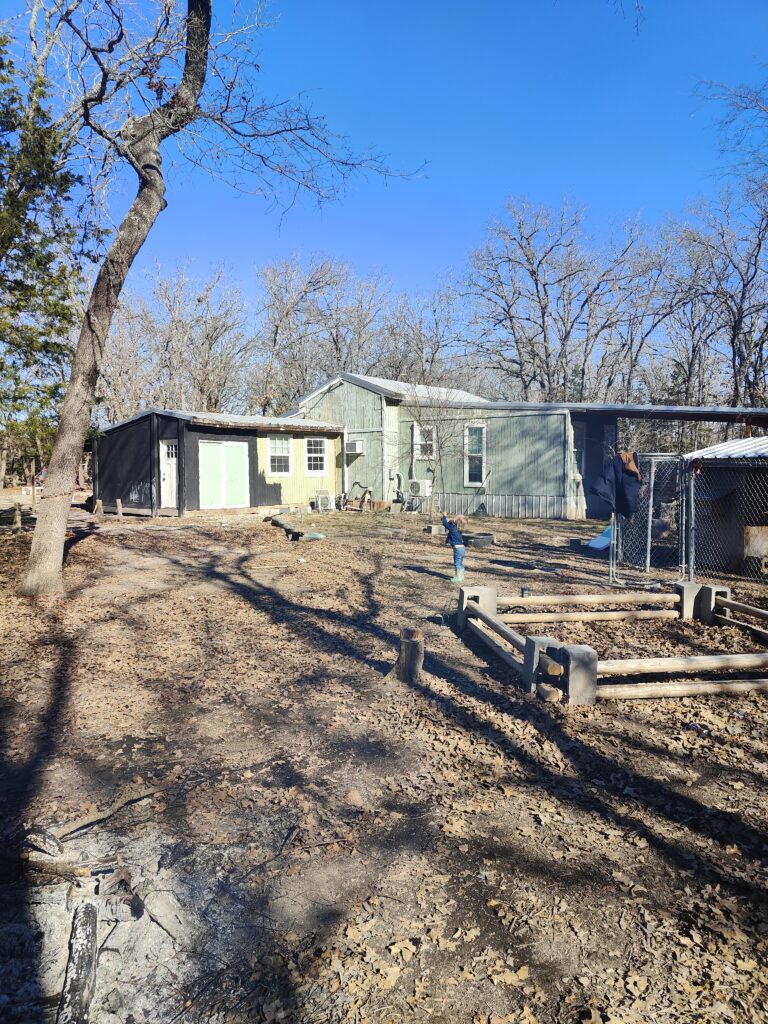
When we were buying rural land , we were excited—like most new homesteaders. It was our shot at freedom, space, and building something real. What we didn’t realize was how wildly different buying rural property is compared to buying in town. There are things you don’t think to look for—until it’s too late.
We thought we did our homework. We had a general home inspection, we walked the house, we
asked the usual questions. But none of that prepared us for what was really waiting underneath the surface.
Over the next few years, we uncovered one costly surprise after another. Trash hidden around the property. A septic system that had never actually been inspected. A foundation in far worse condition than anyone let on. Electrical work that looked like it was done by a sugar-high child with a screwdriver. Plumbing so sketchy we have a plumber on speed dial.
All in, we’re sitting on well over $100,000 in unexpected repairs—problems that could’ve been spotted (or avoided entirely) with the right inspections and advice.
If you’re looking at buying land—especially for a homestead—you need to read this. Here are the eight things we wish we had known before buying our property. These aren’t little “oh well” lessons. These are the kind of mistakes that drain your savings, stall your progress, and make you wonder what the hell you got yourself into.
1. Hidden Trash and Debris: It’s Not Just “A Little Cleanup”
When you buy rural property, you’re almost guaranteed to inherit trash from previous owners—especially if the land has changed hands a few times. The longer someone lived there, the more likely they left behind forgotten “project piles,” broken equipment, or full-blown junkyards out of sight from the road.
On our 4-acre property, the seller had only been there two years but kept every scrap from every project. The owners before her? They left anything too expensive to haul to the dump rotting behind the tree line. If we’d walked the whole property before buying, we might have knocked a few thousand dollars off the price just for cleanup costs.
Tip: Always walk the entire property. Bring a contractor’s eye if you can—or at least take notes and photos. Some things left behind will be treasures (materials for future projects), but the trash costs time and money to remove.
2. Septic System Surprises: $20K to Learn What That Smell Meant
If you’re buying rural land, you’re almost certainly buying a septic system too. Ours was an aerobic system, and we took comfort in the fact that the seller had documentation showing regular quarterly inspections, as required by state law.
When we noticed a slight odor, the servicing company reassured us it was normal. It wasn’t until two years later we found out the system had major, unrepairable issues. The access lids to three of the tanks were buried—so in reality, no one had been inspecting anything.
We ended up replacing the entire system, at a cost of over $20,000.
Lesson: That smell isn’t “normal.” It might be a chlorine issue, a full trash tank, or worse. Don’t take paperwork or service company smiles at face value. Pay a licensed septic inspector to open the tanks and inspect everything—especially if the access ports aren’t visible.
3. Foundation Problems: $10K Estimate Becomes $50K Reality
We knew the house had foundation issues. Our home inspector didn’t inspect the foundation specifically, but he casually estimated a $6,000–$10,000 repair cost. Our realtor agreed. We closed on the property confident we had a budget for it.
Then we brought in the professionals.
The first foundation company gave us a starting estimate of $50,000. The second company said the same—and added that building a new house might make more sense.
Had we known the true condition, we would’ve offered $50K–$75K less for the property, on top of the $20K septic issue.
Hard truth: Never trust anyone’s foundation estimate unless they’re a structural engineer or foundation specialist—and they’re willing to sign their name to it. Realtors and home inspectors don’t carry the liability, and their guesses can cost you tens of thousands.
4. Electrical Disasters: “Third Grader on a Fun Dip Binge”
We were told there were “some electrical issues,” and even had a $2,000 quote in hand. That ballooned into $5,000+—and that only addressed the surface.
Both structures on our property looked like they were wired by a third grader on their second pack of Fun Dip. Nothing was to code. Nothing made sense. It was a patchwork of cheap DIY jobs and dangerous shortcuts.
Bottom line: Bring in a licensed electrician before closing. Have them inspect every panel, outlet, and structure. Don’t just get a quote—get a real evaluation.
5. Plumbing Woes: Death by a Thousand Leaks
Our plumbing has been a recurring nightmare. Since moving in, we’ve had plumbers on-site nearly every quarter. The original work looks like it was done by someone with a vague idea of what plumbing should be—probably because it was. In rural areas, it’s common for folks to “just figure it out” when YouTube or a neighbor gives them enough confidence to grab a wrench.
In our case, the DIY legacy left us with persistent leaks, mystery lines, and non-code work that’s cost thousands to undo.
Lesson learned: We could’ve avoided all of it by hiring a licensed plumber before we bought. Not just a general home inspector—a specialist. The same goes for septic, foundation, and electrical. If we had brought in professionals in each of those fields, we would’ve seen the real picture and made much better decisions.
6. Appraisal Waiver: How to Buy a Broken Home Without Anyone Noticing
You might be wondering how we managed to buy a property with all these issues. The answer: an appraisal waiver. Because we put down about 33%, our lender skipped a full appraisal. The logic? The land and house were probably worth at least what we were financing.
Technically, that was true. But realistically? We drastically overpaid.
To grease the deal through underwriting, our agent and lender even asked the listing agent to remove certain photos from the listing. The goal was to avoid raising red flags.
What you need to know: An appraisal waiver is not your friend when buying rural property with unknown issues. You want an appraiser with a sharp eye and no skin in the game. The appraisal may slow you down—but it might be the only third-party reality check you get.
7. Insurability: When the House is “Blacklisted” Before You Move In
Insurance isn’t just about rates anymore—it’s about access. Some homes are practically uninsurable, and not because of your history.
Insurance carriers may deny coverage based on prior claims at the address—not who lived there. A property with too many claims in its file becomes radioactive in the eyes of insurers.
On top of that, home condition matters. Carriers are increasingly strict about insuring homes in poor shape. Loose railings, missing siding, outdated wiring—these can all get you denied.
Easy fix: Before you make an offer, give your insurance agent the property address and ask for a quote. They’ll often run the CLUE (Comprehensive Loss Underwriting Exchange) report and tell you if there’s a history of claims. Don’t wait until you’re under contract to find out you can’t get coverage.
8. Get a Realtor Who Actually Knows Rural Property
The agent we used bragged about his background as a mortgage broker. What he didn’t know—or didn’t bother to care about—was how to properly vet a rural property.
A good realtor would’ve insisted we bring in a septic inspector, a foundation company, an electrician, and a plumber. They would’ve helped us use those reports to negotiate the price down—or to walk away altogether. Ours didn’t. Instead, he mirrored the listing agent’s energy: “Let’s get this thing closed.”
Advice from experience: Your realtor is your front line. If they’re not familiar with rural properties, they’re a liability. Interview agents carefully. Ask what inspections they recommend. Ask how many land or homestead properties they’ve closed. If they downplay concerns or resist bringing in specialists, move on.
Conclusion: The Land Is Worth It—But Know What You’re Getting Into
We still love our land. Even after everything—it’s home. But we paid a steep price for our ignorance. Not just in money, but in stress, stalled progress, and the constant feeling of digging ourselves out of someone else’s mess.
If you’re buying land, especially in a rural area, here’s the truth: you have to do your own due diligence. Don’t rely on the seller’s word. Don’t rely on the listing agent. And don’t assume a general home inspection is enough.
Walk the whole property. Hire licensed professionals to inspect every critical system—septic, foundation, electrical, plumbing. Don’t get pressured into a fast close or an appraisal waiver just because the numbers “look good.”
The country doesn’t come with curb and gutter. Out here, the problems are buried—literally. But if you go in with your eyes open, you can make smart decisions and avoid the expensive mistakes we made.
This place was still the right place for us. But it could’ve been so much better if we’d just known what to look for.
Know someone thinking about buying land?
Share this article with them. It might save them from making the same expensive mistakes we did.

Leave a Reply